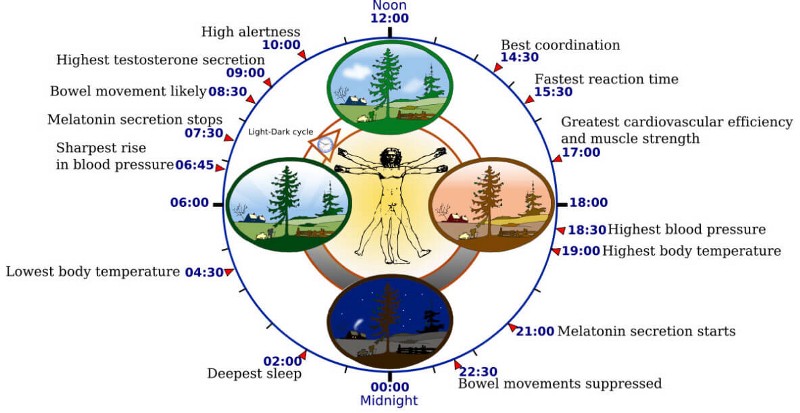Over time, I’ve noticed that if I go to sleep closer to 10:30 pm, and sleep until 6:00 am (7.5 hours total), I wake up feeling refreshed in the morning. If I go to bed closer to 12 am, and sleep until 7:30 am, I have a harder time waking up and have a greater propensity to continue sleeping. The total time spent sleeping stays the same at 7.5 hours, but the time intervals change. Let’s take a closer look.
Just like earth has seasons, your body follows a daily cycle called Circadian Rhythms. These rhythms affect your physical, mental, and behavioral system every 24 hours. According to the National Institute of General Medical Sciences, these changes are influenced by the amount of light in your environment. The sun is the light source that has been a common factor between humans today and our ancestors thousands of years ago. Overtime, our bodies have adapted to the sun cycle.
Let’s travel hundreds of years ago to the lives our ancestors. Edison was not born, electricity was unknown, and the night was a dangerous time for humans to move about. During the day time, we have the light of the sun and we are best able to see in order to hunt, and seek new shelters. As the night settled, it made sense for us to stay put, and we might as well regenerate ourselves during sleep. The body adapted to this clockwork mechanism of day and night, and our Circadian Rhythms were tuned.
Let’s take a look at what happens with our Circadian Rhythms from the chart below: Circadian Rhythms

At 21:00 (9 pm), a sleep inducing hormone called melatonin is secreted by the body to encourage sleep. Strength and alertness is lowered at this time to bring down heart rate. As the sun comes up and hits our eyes, you’ll notice that at 7:30 am, melatonin secretion stops and the body ramps up to high alertness. The times might vary a bit depending on the person, but this is the general rule of thumb.
By going to bed at 10 pm, you’re following your Circadian Rhythms and no resistance arises. By delaying your departure to bed due to distractions such as looking at bright screens at night or by being around bright lights, you are resisting your natural circadian rhythms. It not only throws off your sleep time, but will throw off how you wake up. Your internal clock will have to play make up time. This is likely the reason why not only the total amount of sleeping time matters, but also the sleeping interval.
It’s hard to change nature. It’s easier to go along with it.
